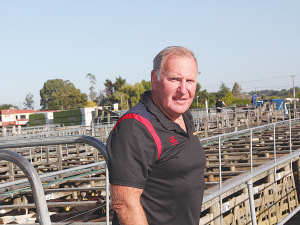Elite young Jersey cows go under the hammer
The sale of a line of elite, high BW, young Jersey cows and heifers is attracting interest from farmers across the country.
 Bill Sweeney says that farmers are now well accustomed to having choice when it comes to selling or buying livestock.
Bill Sweeney says that farmers are now well accustomed to having choice when it comes to selling or buying livestock.
When the door slammed shut on New Zealand in March 2020 it also closed the gate to one of the viability fundamentals of the country’s livestock industry – stock auctions.
Until then, the sale of livestock had primarily been conducted either on-farm or at stock yards but the announcement of a state of national emergency and nation-wide lockdown sent a ripple across the livestock industry.
March is a time when, traditionally, stock auctions ramp up to meet the demand of dairy, sheep and beef farmers to buy and/or sell stock so any disruption to that pattern had the potential to have a real impact on-farm, says long-time stock agent and general manager for NZ Farmers Livestock, Bill Sweeney.
“At the time, farmers were under the pump to move stock. Many had just come through a tough drought with lingering impacts.
“Feed and grass was tight on many farms. Winter and dairy changeovers were approaching and this, combined with long processor wait times and schedule movements, meant there was plenty of demand to get trade moving.
“Thankfully we were already advanced in the development of an online auction platform. We hadn’t planned on launching it so quickly, but the nationwide lockdown saw us work around the clock to refine and launch it so farmers could continue to buy and sell once the country went into Level 3.“Thankfully we were already advanced in the development of an online auction platform. We hadn’t planned on launching it so quickly, but the nationwide lockdown saw us work around the clock to refine and launch it so farmers could continue to buy and sell once the country went into Level 3.”
In a first for New Zealand, NZ Farmers Livestock launched a hybrid online auction platform on 20 April 2020, effectively reopening yards for normal livestock trading.
Walton farmer, Lance Baker, recalls that their first on farm auction of Valda-Rose Hereford bulls coincided with the first year of the pandemic.
“There was so much uncertainty during those early days of Covid around what you could and couldn’t do but thankfully NZ Farmers Livestock had it sorted, enabling us to get on and do what we do best – growing quality bulls.
“Initially the bulk of bidders still attended the sale, but as confidence has grown in bidding and buying online, the numbers have changed so, in 2022, online bidders doubled compared to 2021.”
Karapiro farmers, Richard and Christine Lansdaal breed Jersey bulls which are sold each year at the Lynrich Jersey bull sale, Richard recalling their relief at being able to continue to supply bulls to the market.
“The demand for quality yearling bulls didn’t stop when the country went into lockdown so it was great that to have an online auction platform and protocol which allowed our annual sales to continue.”
Sweeney said that farmers are now well accustomed to having choice when it comes to selling or buying livestock.
“The lockdowns increased demand for companies to provide clients with choice in the way they sold or purchased goods and this is very evident in agriculture where farmers are often geographically isolated.
“We’re proud that our closeness to the market, and our clients, meant we were prepared and able to meet a need when it presented itself.
“Most of our sales continue to offer trading options to farmers – either on-farm, at the stockyards or online.
“This year’s sales are a great example of farmer uptake of the online option with the number of online bidders up by 50% on last year.
“Market confidence is also evident in the record prices we regularly achieve for our clients,” Sweeney said.
Global trade has been thrown into another bout of uncertainty following the overnight ruling by US Supreme Court, striking down President Donald Trump's decision to impose additional tariffs on trading partners.
Controls on the movement of fruit and vegetables in the Auckland suburb of Mt Roskill have been lifted.
Fonterra farmer shareholders and unit holders are in line for another payment in April.
Farmers are being encouraged to take a closer look at the refrigerants running inside their on-farm systems, as international and domestic pressure continues to build on high global warming potential (GWP) 400-series refrigerants.
As expected, Fonterra has lifted its 2025-26 forecast farmgate milk price mid-point to $9.50/kgMS.
Bovonic says a return on investment study has found its automated mastitis detection technology, QuadSense, is delivering financial, labour, and animal-health benefits on New Zealand dairy farms worth an estimated $29,547 per season.
OPINION: Staying with politics, with less than nine months to go before the general elections, there’s confusion in the Labour…
OPINION: Winston Peters' tirade against the free trade deal stitched with India may not be all political posturing by the…